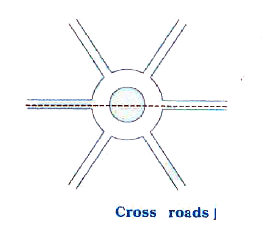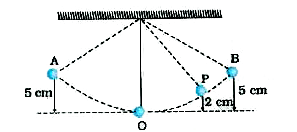Complete Solutions to QUESTION & ANSWER (ANSWER THE FOLLOWING QUESTIONS IN SHORT :) of chapter WORK AND ENERGY of Class 9 book with complete answers and questions
| Class 9 | PHYSICS |
| Chapter | WORK AND ENERGY |
| KUMAR PRAKASHAN | QUESTION & ANSWER (ANSWER THE FOLLOWING QUESTIONS IN SHORT :) |
| Number Of Questions | 60 |
| Academic Year | 2023-24 |
A mass of 10 kg is at a point A on a table. It is moved to a point B. If the line joining A and B is horizontal, what is the work done on the object by the gravitational force? Explain your answer.

View SolutionWhat is the work done by the force of gravity on a satellite moving round the earth? Justify your answer.
View SolutionThink of situation when an obejct gets displaced in the absence of a force acting on it.
View SolutionAn object thrown at a certain angle to the ground moves in a curved path and falls back to the ground. The initial and the final points of the path of the object lie on the same horizontal line. What is the work done by the force of gravity on the object?
View SolutionWhen is the work done by a force is positive and negative ?
View SolutionHow is work calculated, if a applying force to the object (i) there is no displacement (ii) displacement is perpendicular to the force.
View SolutionFour men lift a 250 kg box to a height of 1 m and hold it without raising or lowering it. (i) How much work is done by men in lifting the box? (ii) How much work is done in just holding it? (Take `g=10ms^(-2)`).
View SolutionA boy is moving on a straight road against a frictional force of 5 N. After travelling 1.5 km, he forgot the path at cross roads of radius 100m. He moves on the circular path for one and half cycle and then he moves forward up to 2 km. Calculate the work done by him.

View SolutionName different types of energy. Give the unit of energy.
View SolutionA freely falling object eventually stops on reaching the ground. What happens to its kinetic energy?
View SolutionWrite a suitable reason for heating up of a metal when hit by a fast moving hammer.
View SolutionThe figure show a simple pendulum consisting a bob of mass 100 g. Initially the bob of the pendulum is at rest at O. It is displaced to one side at A. The height of A above O is 5 cm. (i) What is the value of potential energy of the bob at A? (ii) What is the value of kinetic energy of the bob at position P, whose height above O is 2 cm? (Take `g=10ms^(-2)`)

View SolutionCertain force acting on a 20 kg mass changes its velocity from `5ms^(-1)` to `2ms^(-1)`. Calculate the work done by the force.
View SolutionAn object of mass 16 kg has 3200 J of kinetic energy. What will be its velocity?
View SolutionFind the momentum of a body of mass 100 g having kinetic energy 500 J.
View SolutionAn object of mass, m is moving with a constant velocity v. How much work should be done on the object in order to bring the object to rest?
View SolutionCalculate the work required to be done to stop a car of 1500 kg moving at a velocity of `60kmh^(-1)`.
View SolutionCan kinetic energy be negative? Why?
View SolutionGive any four illustrations of the kinetic energy.
View SolutionAn object of mass 40kg is raised to a height of 5 m above the ground. What is its potential energy? If the object is allowed to fall, find its kinetic energy when it is halfway down. (Take `g=10ms^(-2)`.)
View SolutionWhat are the various energy trans-formations that occur when you are riding a bicyle?
View SolutionDoes the transfer of energy take place when you push a huge rock with all your might and fail to move it? Where is the energy you spend going?
View SolutionThe potential energy of a freely falling object decreases progressively. Does this violate the law of conservation of energy? Why?
View SolutionA battery lights a bulb. Describe the energy changes involved in the process.
View SolutionA person holds a bundle of hay over his head for 30 minutes and gets tired. Has he done some work or not? Justify your answer.
View SolutionAn electric heater is rated 1500 W. How much energy does it use in 10 hour?
View SolutionIn each of the following a force F is acting on an object of mass m. The direction of dispalcement is from west to east shown by the longer arrow. Observer the diagrams carefully and state whether the work done by the force is negative, positive or zero.

View SolutionSoni says that the acceleration in an object could be zero even when several forces are acting on it. Do you agree with her? Why?
View SolutionFind the energy in kWh consumed in 10 hour by 4 devices of power 500 W each.
View SolutionA certain household has consumed 250 units of energy during a month. How much energy is this in joule?
View SolutionA mass of 10 kg is at a point A on a table. It is moved to a point B. If the line joining A and B is horizontal, what is the work done on the object by the gravitational force? Explain your answer.

View SolutionWhat is the work done by the force of gravity on a satellite moving round the earth? Justify your answer.
View SolutionThink of situation when an obejct gets displaced in the absence of a force acting on it.
View SolutionAn object thrown at a certain angle to the ground moves in a curved path and falls back to the ground. The initial and the final points of the path of the object lie on the same horizontal line. What is the work done by the force of gravity on the object?
View SolutionWhen is the work done by a force is positive and negative ?
View SolutionHow is work calculated, if a applying force to the object (i) there is no displacement (ii) displacement is perpendicular to the force.
View SolutionFour men lift a 250 kg box to a height of 1 m and hold it without raising or lowering it. (i) How much work is done by men in lifting the box? (ii) How much work is done in just holding it? (Take `g=10ms^(-2)`).
View SolutionA boy is moving on a straight road against a frictional force of 5 N. After travelling 1.5 km, he forgot the path at cross roads of radius 100m. He moves on the circular path for one and half cycle and then he moves forward up to 2 km. Calculate the work done by him.

View SolutionName different types of energy. Give the unit of energy.
View SolutionA freely falling object eventually stops on reaching the ground. What happens to its kinetic energy?
View SolutionWrite a suitable reason for heating up of a metal when hit by a fast moving hammer.
View SolutionThe figure show a simple pendulum consisting a bob of mass 100 g. Initially the bob of the pendulum is at rest at O. It is displaced to one side at A. The height of A above O is 5 cm. (i) What is the value of potential energy of the bob at A? (ii) What is the value of kinetic energy of the bob at position P, whose height above O is 2 cm? (Take `g=10ms^(-2)`)

View SolutionCertain force acting on a 20 kg mass changes its velocity from `5ms^(-1)` to `2ms^(-1)`. Calculate the work done by the force.
View SolutionAn object of mass 16 kg has 3200 J of kinetic energy. What will be its velocity?
View SolutionFind the momentum of a body of mass 100 g having kinetic energy 500 J.
View SolutionAn object of mass, m is moving with a constant velocity v. How much work should be done on the object in order to bring the object to rest?
View SolutionCalculate the work required to be done to stop a car of 1500 kg moving at a velocity of `60kmh^(-1)`.
View SolutionCan kinetic energy be negative? Why?
View SolutionGive any four illustrations of the kinetic energy.
View SolutionAn object of mass 40kg is raised to a height of 5 m above the ground. What is its potential energy? If the object is allowed to fall, find its kinetic energy when it is halfway down. (Take `g=10ms^(-2)`.)
View SolutionWhat are the various energy trans-formations that occur when you are riding a bicyle?
View SolutionDoes the transfer of energy take place when you push a huge rock with all your might and fail to move it? Where is the energy you spend going?
View SolutionThe potential energy of a freely falling object decreases progressively. Does this violate the law of conservation of energy? Why?
View SolutionA battery lights a bulb. Describe the energy changes involved in the process.
View SolutionA person holds a bundle of hay over his head for 30 minutes and gets tired. Has he done some work or not? Justify your answer.
View SolutionAn electric heater is rated 1500 W. How much energy does it use in 10 hour?
View SolutionIn each of the following a force F is acting on an object of mass m. The direction of dispalcement is from west to east shown by the longer arrow. Observer the diagrams carefully and state whether the work done by the force is negative, positive or zero.

View SolutionSoni says that the acceleration in an object could be zero even when several forces are acting on it. Do you agree with her? Why?
View SolutionFind the energy in kWh consumed in 10 hour by 4 devices of power 500 W each.
View SolutionA certain household has consumed 250 units of energy during a month. How much energy is this in joule?
View Solution
QUESTION & ANSWER (ANSWER THE FOLLOWING QUESTIONS IN SHORT :) questions and complete solutions for chapter WORK AND ENERGY of KUMAR PRAKASHAN KENDRA PHYSICS (GUJRATI ENGLISH) of Class 9
All Exercises from KUMAR PRAKASHAN Class 9 PHYSICS WORK AND ENERGY
- ACTIVITY 11.1
- ACTIVITY 11.10
- ACTIVITY 11.13
- ACTIVITY 11.3
- ACTIVITY 11.4
- ACTIVITY 11.9
- INTEXT QUESTIONS AND ANSWERS
- QUESTION & ANSWER (ADDITIONAL NUMERICALS FOR PRACTICE)
- QUESTION & ANSWER (ANSWER THE FOLLOWING QUESTIONS IN BRIEF)
- QUESTION & ANSWER (ANSWER THE FOLLOWING QUESTIONS IN SHORT :)
- QUESTION & ANSWER (ANSWER THE FOLLOWING QUESTIONS IN VERY SHORT)
- QUESTION & ANSWER (CHOOSE THE CORRECT OPTION FROM THOSE GIVEN BELOW EACH QUESTION)
- QUESTION & ANSWER (DISTINGUISH BETWEEN THE FOLLOWING)
- QUESTION & ANSWER (FILL IN THE BLANKS BY SELECTING THE CORRECT ALTERNATIVE FROM THOSE GIVEN IN THE BRACKET)
- QUESTION & ANSWER (FILL IN THE BLANKS)
- QUESTION & ANSWER (GIVE SCIENTIFIC REASONS FOR THE FOLLOWING STATEMENTS :)
- QUESTION & ANSWER (MATCH THE FOLLOWING PROPERLY)
- QUESTION & ANSWER (STATE WHETHER THE FOLLOWING STATEMENTS ARE TRUE OR FALSE)
- QUESTION & ANSWER (TEXUTAL EXAMPLES/NUMERICALS)